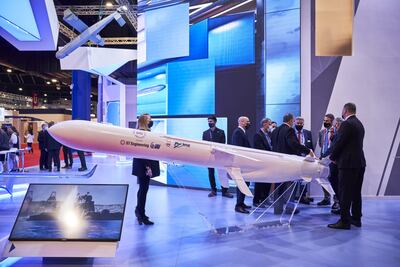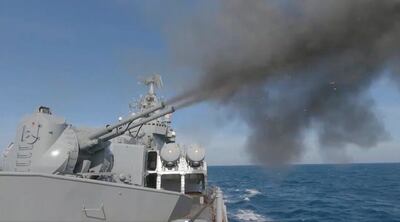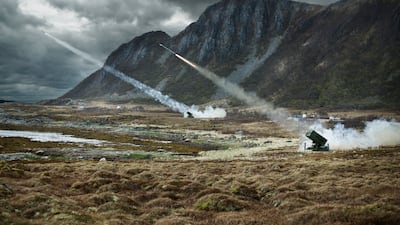Ukraine could soon receive advanced ship-killing missiles with a 400-kilometre range that would prove a “game-changer” for the battle to control the Black Sea, military analysts have told The National.
It is understood that naval defence forces are only weeks away from becoming proficient in operating British-supplied Harpoon and Brimstone anti-ship missiles that will prove a significant concern for Russia’s fleet.
But if the Ukrainians obtain the highly advanced Blue Spear missiles along with the Norwegian-built Naval Strike Missile (NSM) they would significantly challenge Russia’s ability to dominate the Black Sea, maritime experts have said.
With immunity to electronic interference and carrying a warhead in excess of 250 kilograms, the long-range Blue Spear would pose a considerable threat.
The anti-ship missile, developed jointly by Israeli Aerospace and Singapore’s ST Engineering, has only recently become operational but experts believe it is being considered for export to Ukraine.
Another feared weapon is the NSM, designed by top-level manufacturers Kongsberg, made from composite materials that gives it state-of-the-art stealth capabilities difficult for warships to detect.
Both missiles will prove a real concern for the Russians as they have the range and capability to threaten Sevastopol, the vital naval base annexed from Ukraine in 2014.

It will also be a further blow to the Russian navy after it suffered the humiliation of losing the Moskva missile cruiser, flagship of its Black Sea Fleet.
“If acquired by Ukraine, the Blue Spear and NSM would change the picture substantially,” said Dr Sidharth Kaushal of the Royal United Services Institute in London. “It might make it possible for ships to be targeted in port, so that would certainly make Crimea less of a safe operating base for the Russians.”
Former commander Tom Sharpe, who served in the Royal Navy for 25 years, said the Blue Spear could “render the Russians ineffective” because they would look at its capabilities and “know that they can't now operate within the range of any of these missiles”.
A British Royal Navy officer told The National that “this is up-gunning the Ukrainian capability by orders of magnitude”.
Harpoon and Brimstone
The addition of the advanced weapons is likely to happen later this year – if a deal is agreed – but before then the Ukrainians will almost certainly go operational with the Harpoon and Brimstone missile systems.
While it is an older system, the Harpoon Block II has a 124km range carrying a 221kg warhead that skims over the waves at 860kph. Earlier Harpoon models had some success in the Iran-Iraq war in the 1980s.

The Brimstone missile, successfully used by Britain in Afghanistan and Libya, has also been adapted to a naval variant that could extensively defend Ukraine’s coastline but only out to a distance of about 12km. However, with the supersonic missile travelling at Mach 1.3, or 450 metres a second, its small warhead would cause major damage to lighter warships and amphibious landing craft.
Cdr Sharpe suggested that if the Ukrainians could "suppress the Russian naval system”, they could also “in theory operate more freely”.
Submarine attack
The Moskva sinking has led to Russia halting its shore bombardments around Odesa and instead falling back to launch 2,000km-range Kalibr cruise missiles from their Kilo-class submarines, mostly based in Sevastopol.
“These new [Ukrainian] missiles are going to play a much bigger role as the Neptune missile has already really shaken confidence in the Russian fleet,” said Dr Kaushal.
He suggested the Ukrainians would now likely target the diesel-electric Kilos when they are refuelling or at the munition depots rearming.
“When they have to surface in Sevastopol, this will be another area where the long-range strike capabilities come into play,” said the naval expert.
Cdr Sharpe agreed. “This has to be on the list of targets for Ukraine. If you want to defeat a Kalibr-firing submarine, by far and away the best way to do it is when it's alongside, That’s an absolutely legitimate target and the Ukrainians will be doing the maths on that right now,” he said.
With Sevastopol more than 200km from other Ukrainian bases, the Blue Spear and NSM will significantly challenge Russia’s use of the naval port, said former commander Shaurav Gairola, a Jane's Defence Weekly specialist who served for 23 years in the Indian Navy as a submarine missile specialist. “This definitely comes within the range of the missiles so they can really pose a threat to Sevastopol,” he said.

Amphibious suicide
Any attempt to land troops and tanks on Ukraine’s Black Sea coastline would now prove “suicidal”, experts say.
While the Ukrainians possess up to 15 Neptunes, the new missile systems will prove a “gamechanger”, particular for amphibious assault around the key port of Odesa, said Dr Kaushal. “This would be one more reason why this would go very badly for them.”
Cdr Sharpe suggested the Russians could still go for the “full Normandy” – referring to the 1944 D-Day landings in France – “but this would be near-suicidal costing them up to 80 per cent casualties”.
The Royal Navy source said it made “successful amphibious assault extremely difficult unless the Russians are prepared to take high, possibly unacceptable casualties”.
“These new weapons are not to be trifled with,” he said. “From an offensive point of view, the Russians will want to stay away from the long-range stuff.”
Bosphorus challenge
The missiles could also assist in lifting the blockade of Odesa and elsewhere, with 70 per cent of Ukraine’s exports – including wheat for the Middle East – going through the Black Sea before the Russians invaded.
“Being able to deny the Odesa approaches to Russian vessels is going to be critical for Ukraine,” said Dr Kaushal.
Under the Montreux Convention that allows Turkey to shut the Bosphorus strait in times of war, Russia can no longer reinforce its fleet of 20 warships including an estimated four submarines.
If the Ukrainians retook Snake Island, whose defenders famously rebuffed the Moskva on the first day of the war, the Blue Spear could reach to within a few kilometres of the Bosphorus, giving some protection to shipping exports.
“While this does not give Ukraine control over the water, it means no one has got the balance of power,” said Cdr Gairola. “But the Russians do currently have the edge and control the waters.”
But Dr Kaushal argued that the missile would give the Ukrainians a chance "to offset Russia's maritime advantages” and would ultimately see them “challenge the Black Sea Fleet’s freedom of action”.


